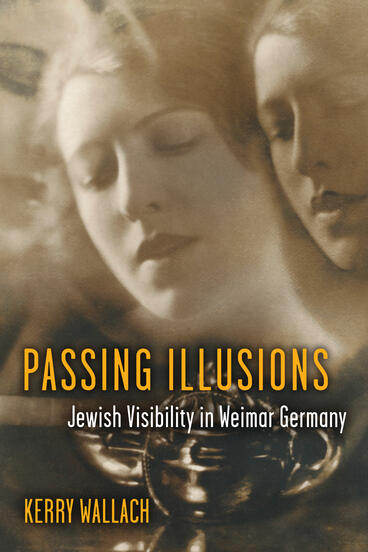Challenges the notion that Weimar Jews sought to be invisible or indistinguishable from other Germans by “passing” as non-Jews
Description
Weimar Germany (1919–33) was an era of equal rights for women and minorities, but also of growing antisemitism and hostility toward the Jewish population. This led some Jews to want to pass or be perceived as non-Jews; yet there were still occasions when it was beneficial to be openly Jewish. Being visible as a Jew often involved appearing simultaneously non-Jewish and Jewish. Passing Illusions examines the constructs of German-Jewish visibility during the Weimar Republic and explores the controversial aspects of this identity—and the complex reasons many decided to conceal or reveal themselves as Jewish. Focusing on racial stereotypes, Kerry Wallach outlines the key elements of visibility, invisibility, and the ways Jewishness was detected and presented through a broad selection of historical sources including periodicals, personal memoirs, and archival documents, as well as cultural texts including works of fiction, anecdotes, images, advertisements, performances, and films. Twenty black-and-white illustrations (photographs, works of art, cartoons, advertisements, film stills) complement the book’s analysis of visual culture.
Kerry Wallach is Associate Professor of German Studies and an Affiliate of the Judaic Studies Program at Gettysburg College.
Reviews
“A powerful and original work of scholarship . . . Wallach brings a fresh theoretical perspective to the study of early twentieth-century German-Jewish history and culture, drawing her concept of passing from African-American and LGBT Studies and paying systematic attention to the category of gender throughout.”
—Jonathan Hess, University of North Carolina at Chapel Hill
“Wallach’s superbly researched study convincingly shows that German Jews of this era not only had the ability to pass or not-pass as Jewish, but also had ample reasons for taking advantage of this powerful assimilation strategy. One of its great strengths is the author’s careful attention to detail about how the need for Jews to pass or not-pass varied according to time, place, and gender.”
—Lisa Silverman, University of Wisconsin-Milwaukee
"Passing Illusions contains insightful discussions of gender issues but also of German Jews’ often complex relationships to East European Jews, coded sometimes as 'authentic,' sometimes as too visibly Jewish. ... [This is] a book one can well recommend to colleagues and graduate students interested in German or Jewish cultural studies."
- Jeffrey Grossman, University of Virginia
-- Monatshefte

